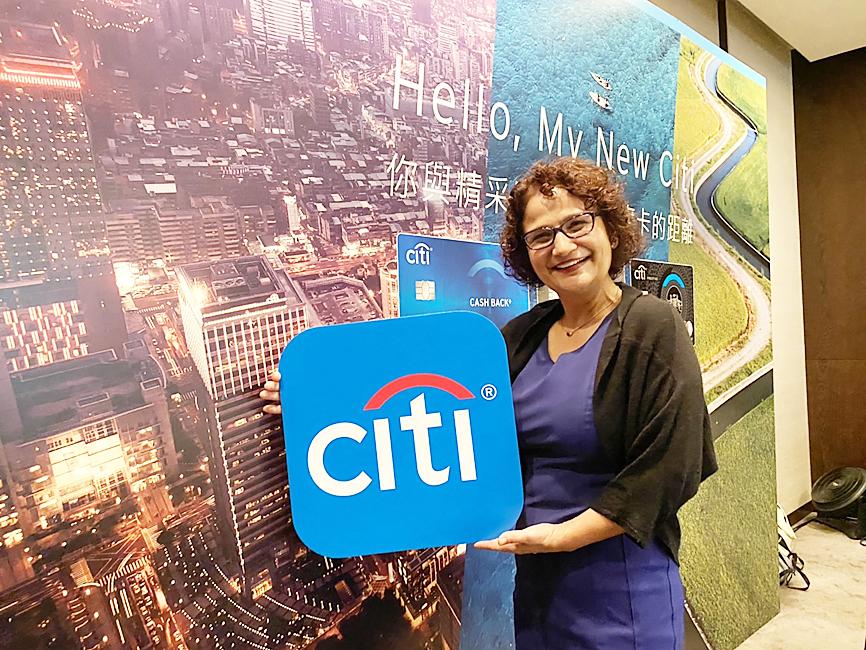Citibank Taiwan Ltd (台灣花旗) has revamped its three credit cards, adding higher reward rates and an improved digital banking app in a bid to attract customers before an expected rebound in credit card spending next year.
The bank has raised the cashback rate of the Citi Cash Back Plus Card to 2 percent on all purchases, domestic and overseas, even insurance premium payments, Citibank told a news conference in Taipei yesterday.
The revamped card offers a higher cashback rate and simpler rules than the previous rate of 0.5 percent on regular purchases, and 1.5 percent on dining, refueling and supermarket spending, as Citibank hopes to encourage people to use the card for all purchases, it said.

Photo: Allen Wu, Taipei Times
As people are embracing mobile payment options, the bank is offering a special cashback rate of 10 percent for new clients who connect their Citi Cash Back Plus Card to one of the 10 most popular electronic wallets in Taiwan, such as Apple Pay, Line Pay Money or Jko Pay (街口支付), within three months of activating the card, it said.
Given that the COVID-19 pandemic has mostly halted international travel, the bank would allow holders of the Citi PremierMiles Card to redeem miles on domestic travel programs, it said, adding that people do not need to worry about miles expiring because they last a lifetime at Citi.
Holders of the Citi Prestige Card can also transfer airport delivery services to domestic travel programs due to the pandemic, it said.
The bank has made the digital banking app more intuitive after receiving complaints from consumers and would continue to improve the app to optimize its digital services, it said.
Credit card spending slowed this year, the bank said, as people canceled overseas travel plans amid the pandemic and did not spend as much on domestic travel as they spend on international travel, Citibank Taiwan country business manager Muge Yuzuak told the Taipei Times at the news conference.
Yuzuak said that she expects spending momentum to remain stable in the first half of next year and to stage a rally in the second half.
“It takes time for a recovery. The virus is unlikely to stop spreading soon, but we expect to have a different story by the end of next year,” Yuzuak said.
Citibank Taiwan, with a total of 2.14 million activated cards, ranks sixth among all of the banks in Taiwan and first among foreign banks, Financial Supervisory Commission data showed.
Asked whether the bank was seeking to improve its ranking, Yuzuak said that the bank concentrates on quality instead of quantity.
Citi aims to build a long-term relationship with customers, she said, adding that customers who feel good about its services would stick with Citi.

UNCERTAINTY: Innolux activated a stringent supply chain management mechanism, as it did during the COVID-19 pandemic, to ensure optimal inventory levels for customers Flat-panel display makers AUO Corp (友達) and Innolux Corp (群創) yesterday said that about 12 to 20 percent of their display business is at risk of potential US tariffs and that they would relocate production or shipment destinations to mitigate the levies’ effects. US tariffs would have a direct impact of US$200 million on AUO’s revenue, company chairman Paul Peng (彭雙浪) told reporters on the sidelines of the Touch Taiwan trade show in Taipei yesterday. That would make up about 12 percent of the company’s overall revenue. To cope with the tariff uncertainty, AUO plans to allocate its production to manufacturing facilities in

TAKING STOCK: A Taiwanese cookware firm in Vietnam urged customers to assess inventory or place orders early so shipments can reach the US while tariffs are paused Taiwanese businesses in Vietnam are exploring alternatives after the White House imposed a 46 percent import duty on Vietnamese goods, following US President Donald Trump’s announcement of “reciprocal” tariffs on the US’ trading partners. Lo Shih-liang (羅世良), chairman of Brico Industry Co (裕茂工業), a Taiwanese company that manufactures cast iron cookware and stove components in Vietnam, said that more than 40 percent of his business was tied to the US market, describing the constant US policy shifts as an emotional roller coaster. “I work during the day and stay up all night watching the news. I’ve been following US news until 3am

Taiwan will prioritize the development of silicon photonics by taking advantage of its strength in the semiconductor industry to build another shield to protect the local economy, National Development Council (NDC) Minister Paul Liu (劉鏡清) said yesterday. Speaking at a meeting of the legislature’s Economics Committee, Liu said Taiwan already has the artificial intelligence (AI) industry as a shield, after the semiconductor industry, to safeguard the country, and is looking at new unique fields to build more economic shields. While Taiwan will further strengthen its existing shields, over the longer term, the country is determined to focus on such potential segments as

COLLABORATION: Given Taiwan’s key position in global supply chains, the US firm is discussing strategies with local partners and clients to deal with global uncertainties Advanced Micro Devices Inc (AMD) yesterday said it is meeting with local ecosystem partners, including Taiwan Semiconductor Manufacturing Co (TSMC, 台積電), to discuss strategies, including long-term manufacturing, to navigate uncertainties such as US tariffs, as Taiwan occupies an important position in global supply chains. AMD chief executive officer Lisa Su (蘇姿丰) told reporters that Taiwan is an important part of the chip designer’s ecosystem and she is discussing with partners and customers in Taiwan to forge strong collaborations on different areas during this critical period. AMD has just become the first artificial-intelligence (AI) server chip customer of TSMC to utilize its advanced